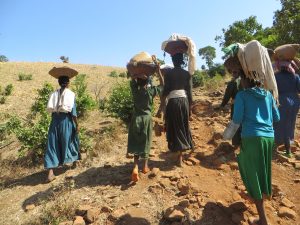Women play a critical and potentially transformative role in agricultural growth in developing countries, but they face persistent obstacles and economic constraints limiting further inclusion in agriculture. A workshop on "The Women’s Empowerment in Agriculture Index (WEAI): Quantitative and Qualitative Approaches" was conducted on December 4, 2019 for up-and-coming researchers of the Ethiopia Strategy Support Program (ESSP) and Eastern and Southern Africa office (ESAO) of IFPRI. The workshop was intended to familiarize the participants with the Index and was given by Audrey Pereira, Chloe van Biljon and Emily Myers, Research Analysts at IFPRI, Washington DC.
The presentation began by by discussing the objectives of gender-sensitive agricultural development programs: reach, benefit and empower. While “reach” programs include women in program activities, “benefit” type of programs aim to increase the wellbeing of women. “Empower” programs are set out to strengthen ability of women to make strategic life choices and to put those choices into action. While each of these types of programming follows different strategies and activities to achieve these aims, all need appropriate indicators to measure women’s empowerment at the project and at the portfolio level.
The Women’s Empowerment in Agriculture Index (WEAI) measures the empowerment, agency, and inclusion of women in the agriculture sector in an effort to identify ways to overcome those obstacles and constraints. The Index is a significant innovation in its field and aims to increase understanding of the connections between women’s empowerment, food security, and agricultural growth. It measures the roles and extent of women’s engagement in the agriculture sector in five domains:
- decisions about agricultural production,
- access to and decision-making power over productive resources,
- control over use of income,
- leadership in the community, and
- time use.
It also measures women’s empowerment relative to men within their households. The WEAI is a composite measurement tool that indicates women’s control over critical parts of their lives in the house-hold, community, and economy. The WEAI was developed to track the change in women’s empowerment levels that occurs as a direct or indirect result of interventions under Feed the Future, the US government’s global hunger and food security initiative. The United States Agency for International Development, International Food Policy Research Institute, and Oxford Poverty and Human Development Initiative collaboratively developed it. You can find the presentation here and more resources here.
